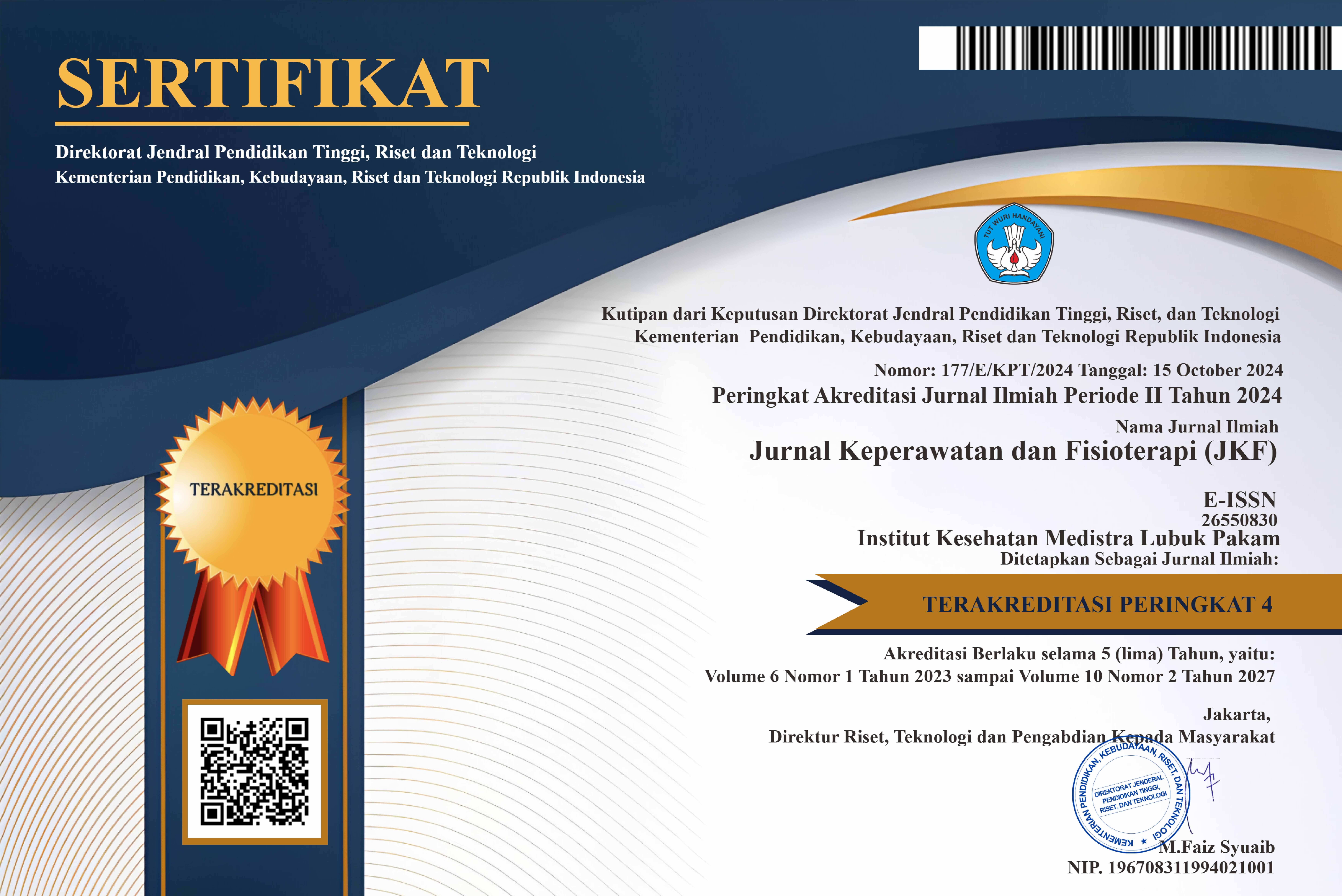Analysis of Golden Period Delay in Severe Head Trauma Patients at Primary Health Care Facilities
DOI:
https://doi.org/10.35451/jkf.v6i1.2530Keywords:
Severe head trauma, golden period, delayed treatment, primary healthcare facility, education level, comorbid diseases.Abstract
Severe head trauma is a major cause of global morbidity and mortality, especially in productive age. Rapid treatment in the golden period (first 1-2 hours post-trauma) is crucial to prevent serious complications. This study aims to analyze the factors that influence the delay in handling the golden period in severe head trauma patients in primary health facilities in Deli Serdang Regency. The design of this study was descriptive analytic with a cross-sectional approach. A sample of 110 severe head trauma patients was selected by purposive sampling according to the inclusion criteria. Data were collected through structured interviews and medical record analysis, then analyzed using the chi-square test to identify the relationship between independent and dependent variables. The results of univariate analysis showed that 70% of patients experienced delayed treatment beyond the golden period. The distribution of patient characteristics was as follows: 60% had low education, 55% had comorbid diseases, 52% were over 40 years old, and 58% were male. Bivariate analysis indicated a significant association between low education level (p=0.002; OR=5.966; 95% CI=2.02-17.56) and the presence of comorbid diseases (p=0.015) with delayed treatment. Patients with low education had a 5.966 times greater risk of delayed treatment compared to those with higher education. However, no significant association was found between age or gender and delayed treatment. These findings emphasize the importance of public education regarding the urgency of immediate treatment in severe head trauma, especially for individuals with low education. In addition, capacity building of primary healthcare facilities through training of medical personnel and provision of adequate equipment is needed to reduce delayed treatment and improve patient prognosis.
Downloads
References
Simanjuntak, D. (2020). Cedera Kepala: Klasifikasi dan Penanganannya. Yogyakarta: Pustaka Medika.
Rofi'i, A. (2019). Gambaran Karakteristik Pasien Cedera Kepala Akibat Kecelakaan Lalu Lintas di Rumah Sakit Daerah Dr. Soebandi Kabupaten Jember. Jurnal Kesehatan, 1-84.
Sesrianty, V. (2019). Hubungan Karakteristik Perawat dengan Penanganan Awal Pasien Cedera Kepala di Ruangan IGD. Jurnal Kesehatan Perintis, 4(2), 85-90.
Yudha, R. (2022). Hubungan Pengetahuan dengan Kemampuan Perawat dalam Penatalaksanaan Kegawatdaruratan Jalan Nafas pada Pasien Cedera Kepala di IGD RSUD Undata. Jurnal Kesehatan Tambusai, 4(3), 4446.
Meilando, A. (2020). Faktor-Faktor yang Mempengaruhi Nilai Glasgow Outcome Scale pada Pasien Cedera Otak Berat Traumatik di RSUD Depati Hamzah. Majalah Kedokteran FKUB, 4(4), 216-222.
Dian, R. (2009). Analisis Kejadian Trauma Kepala di RSU Dr. Soetomo Surabaya Tahun 2008. Surabaya: Universitas Airlangga.
Kementerian Kesehatan RI (2018). Laporan Nasional Riskesdas 2018. Jakarta: Badan Penelitian dan Pengembangan Kesehatan.
Rendy, M. C., & Margareth, T. H. (2020). Asuhan Keperawatan Medikal Bedah Penyakit Dalam. Yogyakarta: Nuha Medika.
Yanti, Y., Agustiani, S., & Agustin, A. (2024). Faktor-Faktor yang Berhubungan dengan Kemampuan Perawat dalam Penatalaksanaan Cedera Kepala di IGD RSUD Undata. Jurnal Kesehatan, 5(1), 15-25.
Setyawati, A. (2022). Sikap Manusia. Yogyakarta: Liberty.
Siswanti, R. (2023). Hubungan Karakteristik Perawat dengan Tingkat Pengetahuan tentang Triage pada Perawat di RSUD Undata. Jurnal Kesehatan, 6(2), 30-40.
Marbun, A. S. (2021). Manajemen Cedera Kepala. Jakarta: UNIQHBA Press.
Kementerian Kesehatan RI (2018). Riset Kesehatan Dasar (Riskesdas) 2018. Jakarta: Badan Penelitian dan Pengembangan
Downloads
Published
Issue
Section
License
Copyright (c) 2023 Siti Hardianti

This work is licensed under a Creative Commons Attribution 4.0 International License.
Copyright in each article is the property of the Author.


























